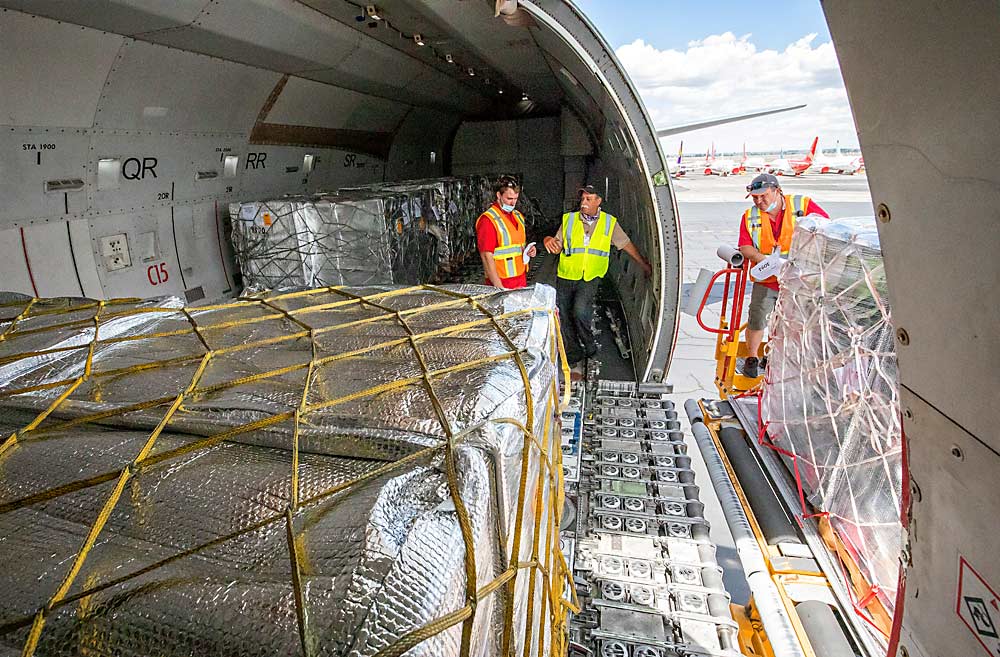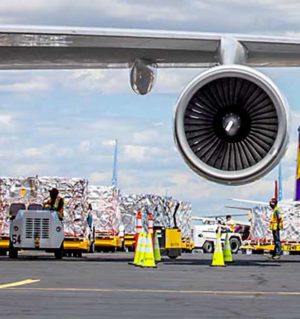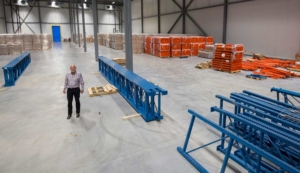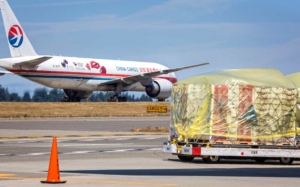
While the coronavirus flight slowdown took a toll on cherry exports this year, traffic increased at the developing cargo area of Grant County International Airport in Moses Lake, Washington.
Cherry cargo flights from the rural airport to Chinese cities have grown steadily in the first three years of operations, in spite of increased tariffs.
About 20 Boeing 747 cargo jets, each holding roughly 114 metric tons of cherries, were expected to take off from Moses Lake by the end of the Northwest cherry season, said Jeff Akridge, president of Columbia Pacific Aviation, an air services company that manages the shipments.
That’s still small potatoes compared to the Northwest cherry industry’s main export route through Seattle-Tacoma International Airport, or Sea-Tac. Grant County exported only about 5 percent of the volume and 4 percent of the dollar value that shipped through Sea-Tac in 2018, the only year figures for both airports were available.
But the Moses Lake airport has an advantage over its bigger cousin to the west: a committed cold chain. Columbia Pacific Aviation has roughly 15,000 square feet of chilled, insulated warehouse space where cherries remain until seconds before crews load them onto an idling plane less than a football field away. In fact, staff driving golf-cart-like towing vehicles back up to the cold room curtains to hitch up and wait their turn, leaving the cherries inside until the very last moment.
“I would say the biggest thing is it’s helping our cold chain,” said Bryan Peebles, export manager for Chelan Fresh, the company that cultivated the relationship with Columbia Pacific Aviation and the Grant County airport.
Sea-Tac’s cargo area density and demand for overnight passenger plane parking make such cold-chain logistics financially unfeasible for a short-season crop such as cherries, said Ken Galka, air cargo operations manager at Sea-Tac. Cold storage warehouses are owned and operated by ground handling agents and usually are not located immediately adjacent to the loading area, meaning pallets of cherries spend more time on the pavement under insulated tarps.
“In that way, we are kind of envious of what they can do,” Galka said.
Steady three-year growth
The development of the Moses Lake airport, known for pilot training, military use and as a parking lot for the infamous Boeing 737 Max planes grounded by the Federal Aviation Administration, was driven mostly by Columbia Pacific Aviation’s investment and interest from Chelan Fresh.
In 2018, the first year of the cherry flights, Columbia Pacific converted two hangars to cold storage and built another the next year. It was a risk, but Akridge saw the potential.
“We could see that it was a ‘you build it they will come’ situation,” he said.
This year, cherry exports were projected to make up about 22 percent of the overall shipments, down from the normal 30 percent, said B.J. Thurlby, president of the Northwest Cherry Growers, the Yakima, Washington, organization representing fresh cherries from Washington, Oregon, Idaho, Montana and Utah.
The coronavirus curtailed passenger air traffic all over the world, and a large bulk of air cargo is shipped in the belly of passenger planes, even if it first leaves Washington on cargo freighters. Northwest Cherry Growers concentrated their promotions on major hubs, such as Korea, but pulled back on countries such as Vietnam, simply because it was tough to deliver fruit, Thurlby said.
So far, Grant County flights only go to Chinese cities, the largest potential market. This year, the industry shipped less than 1 million boxes to China overall, Thurlby said, a far cry from over 3 million boxes in 2017. Tariffs were partly to blame, but the coronavirus and higher domestic demand played a larger role, he said. Prices were still high, which was good news, but officials noticed more Turkish fruit competing this year than ever before, he said.
Grant County’s cherry business grew, in spite of all of this, from 15 flights last year to 20 this year, Akridge said. Companies beyond Chelan Fresh are now using the airport, though he declined to name them.
Akridge and Port of Moses Lake officials have loftier goals than just cherries, too. They commissioned some preliminary studies of exporting blueberries, for example, and launched an effort to import consumer goods from China to create the coveted two-way traffic that makes any shipping operation financially feasible.
“Two-way is the way to make it work,” Akridge said.
Grant County is already an international airport with a federal customs officer, paid by the airport, to inspect outgoing agricultural products. But airport officials are lobbying the U.S. Customs and Border Protection agency to designate the grounds as a port of entry, which would mean a larger customs team paid for by the federal government, said Don Breazeale, a Seattle-area transportation logistics consultant hired by the Port of Moses Lake.
Under a pilot project, Breazeale, Akridge and port officials have courted a few cargo customers to ship textiles and electronics into Grant County this fall. If Customs and Border Protection and an oversight delegation from the U.S. Congress agree, the airport could have the full designation by early next year. •
—by Ross Courtney









Leave A Comment